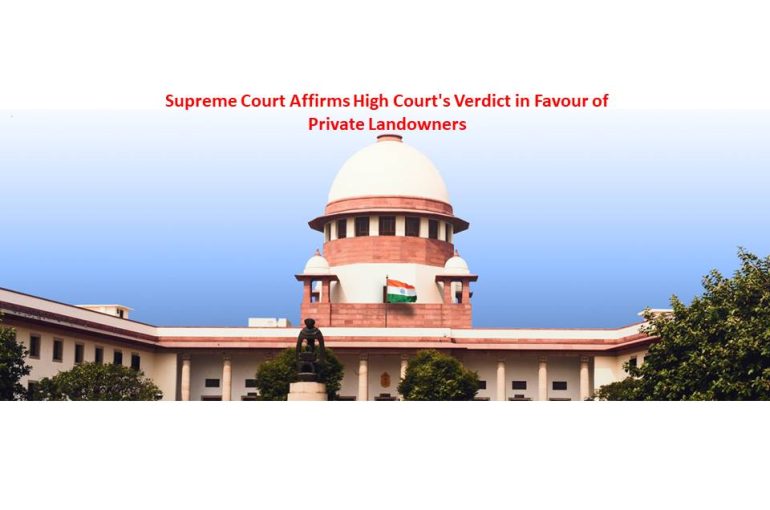Supreme Court Affirms High Court’s Verdict in Favour of Private Landowners
In a landmark judgement (State of Haryana & Anr. v. Amin Lal through LRs & Ors., 2024 INSC 875), the Supreme Court of India (Division Bench) upheld the Punjab and Haryana High Court’s decision favouring the private landowners against the State of Haryana and its Public Works Department (PWD). The case, arising from disputes over land ownership and adverse possession, has significant implications for property law and the State’s obligations as a welfare entity.
Background
The dispute concerned land situated in Bahadurgarh, Haryana, adjacent to National Highway No. 10. The original Plaintiffs, Amin Lal and Ashok Kumar, filed a suit in 1981, claiming ownership of the land based on revenue records. They alleged that the State had unauthorizedly occupied the land in 1980 and sought its possession.
Conversely, the State of Haryana claimed ownership through adverse possession, asserting continuous occupation since 1879-80. The Trial Court ruled in favour of the Plaintiffs, but the First Appellate Court reversed this, dismissing their claims. The High Court later reinstated the Trial Court’s decision, prompting the State to approach the Supreme Court.
Supreme Court’s Analysis
Justice Vikram Nath, delivering the judgement, addressed pivotal questions surrounding property ownership, adverse possession, and the State’s obligations under constitutional law.
1. Ownership Established Through Revenue Records:
The Court emphasised that revenue records such as jamabandis, supported by registered sale deeds, provided substantial evidence of the Plaintiffs’ ownership. The sale deeds, dating back to 1960 and 1973, were corroborated by mutation records.
While revenue records alone do not confer title, they serve as admissible evidence when supported by documentary proof.
2. Adverse Possession Claim by the State:
The Court dismissed the State’s plea of adverse possession, reiterating that such a claim cannot be made against citizens. Citing Vidya Devi v. State of H.P. (2020) 2 SCC 569, (2011) 10 SCC 404, and State of Haryana v. Mukesh Kumar (2011), the judgement highlighted that a welfare State must adhere to constitutional principles and protect, rather than appropriate, private property.
The Court clarified that adverse possession requires proof of continuous, open, and hostile possession for the statutory period. The State’s possession was deemed permissive, as documented in the Misal Hakiyat of 1879-80.
3. Burden of Proof and Pleading Standards:
By pleading adverse possession, the State implicitly admitted the Plaintiffs’ title. Under Order VIII Rule 5 of the Civil Procedure Code, failure to deny a fact specifically amounts to its admission.
The Court criticised the First Appellate Court for improperly shifting the burden of proof onto the Plaintiffs and disregarding the presumption of correctness afforded to revenue records under Section 35 of the Evidence Act.
4. High Court’s Jurisdiction under Section 100 CPC:
The Court upheld the High Court’s intervention, stating that substantial questions of law—such as the admissibility of adverse possession by the State and its implications for ownership—justified appellate review. The High Court rectified legal and factual errors made by the First Appellate Court.
Key Takeaways
This ruling reiterates that the doctrine of adverse possession cannot be invoked by the State against its citizens. Doing so would undermine constitutional rights and erode public trust.
Revenue documents, when corroborated by sale deeds and mutations, remain crucial for establishing ownership.
Plaintiffs must establish their title in possession suits, but a defendant claiming adverse possession bears the burden of proving hostile and continuous possession.
Conclusion
The Supreme Court’s decision reaffirms the principles of property law and the State’s constitutional duties. It underlines that the State, as a welfare entity, cannot exploit doctrines like adverse possession to claim ownership of private property. This judgement not only upholds the rights of citizens but also sets a precedent ensuring accountability and fairness in land disputes involving governmental entities.
Sakshi Raghuvanshi
Senior Associate
The Indian Lawyer & Allied Services





































Leave a Reply